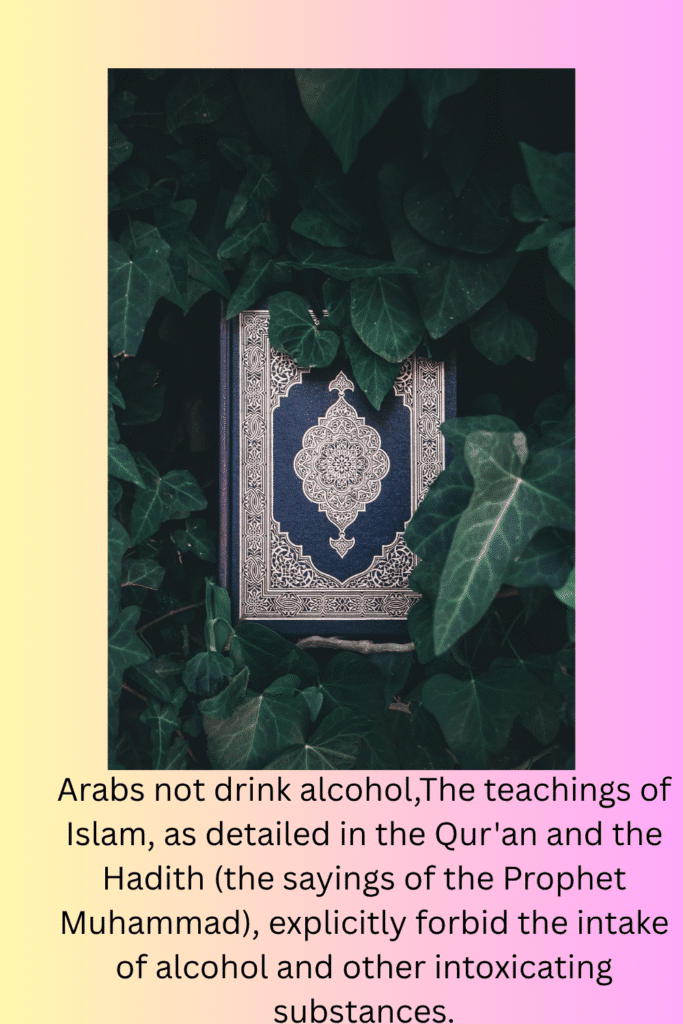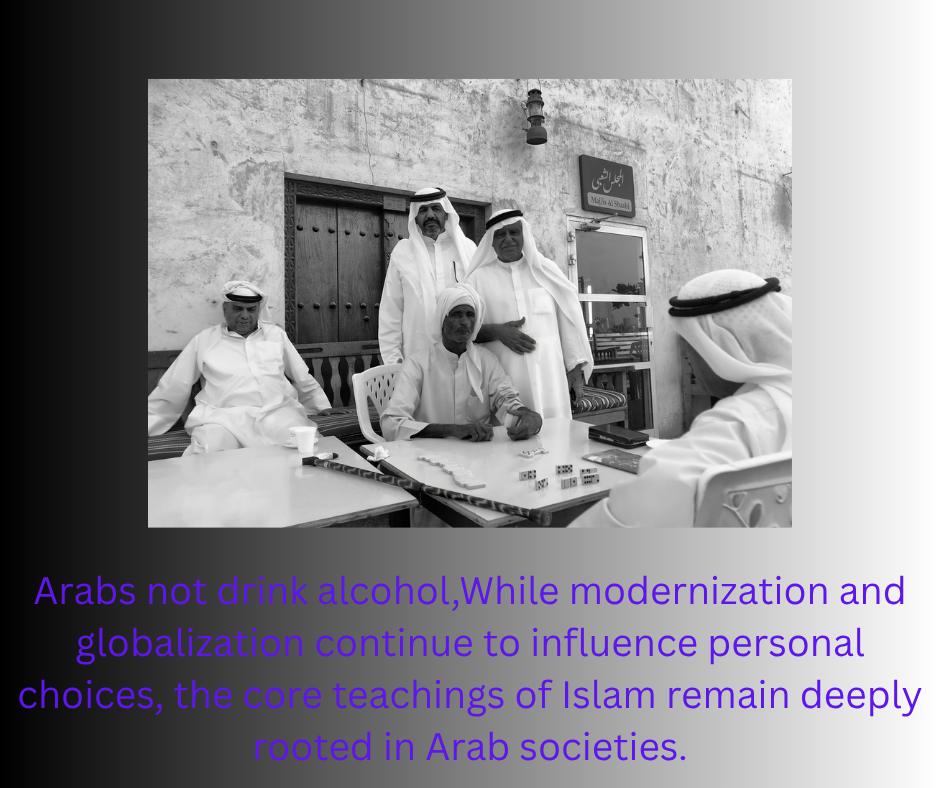Arabs not drink alcohol,Alcohol is one of the most widely consumed substances around the world, often associated with social gatherings, celebrations, and even religious ceremonies in some cultures. However, in many Arab societies, alcohol is either strictly avoided, heavily restricted, or outright illegal. This has led many people to wonder:

To answer this question, we must explore the religious, cultural, legal, and historical reasons behind the Arab world’s relationship with alcohol. While not all Arabs are Muslim and not all Muslims are Arab, Islamic influence plays a dominant role in shaping Arab societies’ stance on alcohol consumption. But the explanation goes deeper than religion alone.
Table of Contents
we’ll break down the main factors that explain why alcohol is largely prohibited or discouraged in Arab countries and cultures.
Religious Influence: The Core of Alcohol Prohibition
The main reason that a significant number of Arabs abstain from alcohol is due to Islam, which is the leading religion in the Arab world. Arabs not drink alcohol,The teachings of Islam, as detailed in the Qur’an and the Hadith (the sayings of the Prophet Muhammad), explicitly forbid the intake of alcohol and other intoxicating substances.
a. What the Qur’an Says About Alcohol
The Qur’an addresses alcohol in several stages, moving from tolerance to prohibition:
• In Surah Al-Baqarah (2:219), “They ask you about wine and gambling.” Say, “There is great sin in them, but there is also some benefit for people.” But their evil outweighs their advantage.
• Surah An-Nisa, verse 4:43: “O faithful ones, abstain from coming near to prayer while intoxicated, until you comprehend the words you utter…”
• Surah Al-Ma’idah (5:90-91): “O you who believe! Intoxicants and gambling, [sacrificing on] stone alters [to other than Allah], and divining arrows are all defilements of Satan’s work, so shun them if you want to succeed.”
This progression in the Qur’an reflects a growing awareness of the harm caused by alcohol, ending in a complete prohibition.
b. Prophet Muhammad’s Teachings
Through his words and deeds, the Prophet Muhammad upheld the Qur’anic position. “Anything that intoxicates in large quantities is also prohibited in small quantities,” he stated. (Sunan Ibn Majah Hadith)
To demonstrate how seriously Islam takes the matter, Arabs not drink alcohol,he also cursed ten groups of persons who work in the alcohol industry: the manufacturer, supplier, buyer, server, and consumer.
Cultural Identity: Alcohol and Arab Traditions
In many Arab societies, Islam is not just a religion; it is deeply woven into daily life, customs, and national identity. The avoidance of alcohol is considered part of maintaining modesty, purity, and moral character.
a. Family and Social Expectations
In traditional Arab culture:
- Drinking alcohol is associated with immorality, loss of self-control, and shame.
- Families expect members to represent religious values, especially men, who are viewed as the moral leaders of households.
- Women drinking alcohol is particularly frowned upon, as it is seen to violate modesty and honor codes.
Those who drink may be labeled as “Westernized” or “irreligious,” facing judgment or even exclusion.
b. Hospitality without Alcohol
Unlike Western hospitality, which often includes serving wine or beer, Arab hospitality focuses on tea, coffee (especially Arabic qahwa), dates, and food. Arabs not drink alcohol,These show the importance of respect, togetherness, and customs.

Legal Restrictions: Alcohol Laws in Arab Countries
In many Arab nations, alcohol is either banned or tightly regulated. Arabs not drink alcohol,The laws depend on each country’s interpretation of Islamic law (Sharia) and political context.
a. Countries with a Total Ban on Alcohol:
- Saudi Arabia
- Kuwait
- Libya
- Somalia
- Afghanistan (culturally Arab-influenced)
In these countries:
- Possessing, consuming, or distributing alcohol can result in severe punishments, including fines, jail time, or public flogging.
- Travelers and non-Muslims are also subject to these laws.
b. Countries with Controlled or Partial Access:
• United Arab Emirates (UAE): Non-Muslims are permitted to consume alcohol in specific localities.
In Qatar, Bahrain, and Oman, the consumption of alcohol is restricted to licensed establishments and is typically forbidden for Muslims.
• More liberal Arab nations like Egypt, Jordan, Lebanon, Morocco, and Tunisia permit alcohol consumption, but they frequently place limitations on it due to local laws or religious festivals.
c. Religious Holidays and Alcohol Bans
During Ramadan, many Arab countries implement a complete ban on alcohol sales, even to non-Muslims. This reflects the month’s spiritual significance and respect for fasting Muslims.
Social and Religious Consequences of Drinking
In Arab societies, drinking alcohol is not just a legal matter; it carries heavy social and religious consequences.
a. Loss of Respect and Reputation
- Individuals who drink may lose community standing, especially in rural or conservative regions.
- Drinking is considered a sinful behavior that can tarnish family honor.
b. Religious Guilt and Accountability
Believers who secretly consume alcohol may experience spiritual guilt, fearing that their sins will be recorded and judged on the Day of Judgment.
- The concept of haram (forbidden) plays a big role in Islamic thinking.
- Public repentance and returning to the path of taqwa (God-consciousness) are often encouraged.
Scientific and Health-Based Reinforcement
Arabs not drink alcohol,Some modern Arabs also cite health reasons for avoiding alcohol. Islam’s prohibition is seen by many as ahead of its time, given today’s understanding of:
- Alcoholism and addiction
- Liver disease and cancer risks
- Domestic violence and drunk driving
- Depression and anxiety linked to alcohol abuse
This reinforces the belief that Islamic law protects both body and soul, making abstinence from alcohol a wise choice beyond spiritual reasons.
The Influence of Colonialism and Modernization
While alcohol avoidance is deeply rooted in Islamic tradition, colonial history and modern globalization have created tension between traditional values and Western lifestyles.
a. Colonial Legacy
European colonialists introduced alcohol into many Arab regions, particularly:
• Algeria, Morocco, and Tunisia (France in North Africa)
• Levant (French influence in Syria and Lebanon, British presence in Palestine)
During these times, alcohol became a symbol of Western domination, causing resistance from local Islamic leaders who viewed it as an attack on faith and identity.
b. Modernization and Youth Culture
Today, some younger Arabs, especially in urban centers, are exposed to Western media and may experiment with alcohol, particularly in countries with lenient laws. However, this remains controversial.
- Some youth hide their drinking habits from families.
- Others debate religious teachings versus personal freedom.
Still, the majority of Arab youth identify with Islam and respect the prohibition, choosing not to drink.
Do All Arabs Avoid Alcohol?
It’s important to clarify that not all Arabs are Muslim, and not all Muslims abstain from alcohol.
a. Christian Arabs
There are millions of Arab Christians, especially in countries like:
- Lebanon
- Egypt (Coptic Christians)
- Jordan
- Palestine and Syria
Arab Christians may drink alcohol, particularly wine, during religious ceremonies like the Eucharist. However, they often respect the cultural norms of Muslim-majority societies by not drinking publicly.
b. Secular Arabs or Cultural Muslims
Some Arabs identify as secular or culturally Muslim, meaning they may not follow religious laws strictly. In places like Lebanon or parts of Morocco and Tunisia, you may find:
- Bars and nightclubs
- Alcohol served at weddings and private events
- Locally produced wine and beer industries
Yet, even here, alcohol consumption is more private and discreet compared to Western norms.
Alcohol Smuggling and Illegal Trade
In countries where alcohol is banned, there is often an underground black market for alcohol:
- Saudi Arabia has had cases of homemade liquor known as “siddiqui.”
- Smuggling from neighboring countries is common in dry regions.
- Illegally brewed alcohol is dangerous and sometimes fatal.
This underground scene highlights the ongoing tension between religious law, state policy, and individual behavior.
Conclusion:
- So, what is the reason Arabs refrain from consuming alcohol? The explanation is rooted in a strong mix of:
- Islamic religious teachings
- Cultural expectations
- Legal restrictions
- Historical identity
- Spiritual beliefs
- Health awareness
For most Arabs, avoiding alcohol is not just about obeying a rule — it’s about maintaining purity, discipline, family honor, and closeness to God. It’s also a reflection of their commitment to an Islamic way of life that values consciousness, moderation, and morality.
Arabs not drink alcohol,While modernization and globalization continue to influence personal choices, the core teachings of Islam remain deeply rooted in Arab societies. As a result, many Arabs proudly abstain from alcohol, viewing it not as a limitation, but as a source of strength, identity, and spiritual clarity.